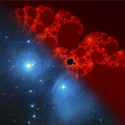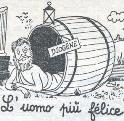|
Who Am I? I am Mors Rattus and I'm Jewish! And an atheist. These are simultaneously true and non-contradictory. I had a Bar Mitzvah and got raised Conservative Jewish, but that's just one way to be Jewish, and if I had to pick a denomination these days it'd probably be Reform. I don't go to shul pretty much ever; my engagement with Judaism is academic and textual. I read and I argue, usually with long-dead rabbis. What Is This? In this thread, I am going to be walking through the Jewish Bible, aka the Tanakh. I want to do this because last week, I poo poo you not, I had to explain to a lady that I don't celebrate Easter or believe in Jesus and that Jews have more holidays than Hannukah. (Hannukkah? Chanukah? They're all valid!) She knew I was Jewish beforehand, yes. This convinced me that people might know way less about Judaism than I thought, given I live in an area that actually has multiple shuls and a sizable Jewish community. I welcome questions about Judaism, Jewish posters sharing their experiences and lively (but respectful) debate about the meaning of the text. One thing that is very important and distinct from a lot of modern Christian approaches to the text - and particularly modern American Protestant approaches - is that the text is alive. Not that we change it, but reading it without commentary is not reading it. (Unless you're a Karaite, but I don't think there's many of those around these days.) The Jewish methods of interacting with our texts involve a lot of debate, argument, commentaries and commentaries on commentaries. The most famous of these, by medieval French rabbi Rashi, aka Rabbi Shlomo Yitzchaki (RaShI, you see, a lot of famous rabbis have nicknames like this) is pretty much included in every Tanakh I've ever read. How's This Gonna Work? I'm gonna be posting quotes here at least once a day, trying to cover...well, however big a chunk of a chapter I feel I can handle interestingly. I'm going to talk through the verse, the Rashi commentary and anything else that catches my eye. I cannot, notably, read Hebrew or Aramaic; this means there's a lot of commentary I can't engage with! It makes me sad. However, we'll be doing our best together. I'm not an expert so much as an engaged amateur at exegesis myself, but I'm going to try and explain both the original context of what we read and how I view them today. There's a lot of stuff in there that...can be pretty fuckin' iffy from a modern, intersectional viewpoint. For modern Jews, a lot of engaging with the text can be reinterpreting or learning to understand through the lens of past interpretations. Or just flat-out disagreeing, in some cases. There's a lot of ways to be Jewish! Anything else I need to know? The site I'll be using is Sefaria.org. It isn't my favorite translation, but it is my favorite site for this stuff, since it doesn't involve having to deal with the potential political entanglements of, say, Chabad. This is not a thread about modern politics except insofar as they may come up through the text. All things are political, yes, but, short version: demanding Jews to tell you their views on the Israel/Palestine conflict is going to do nothing but piss everyone off and is pretty antisemitic. Please don't do that. Really please don't do that. We don't need to show you our bona fides. Likewise, please don't argue about circumcision here. It's the first, fundamental sign of the covenant between Abraham and the Lord. This is not the place to argue about whether it should be done. There's also going to be a lot of vocabulary and arguing based on word usage. This is because traditionally, it is held that every word in the Torah is specifically chosen, and by examining how those words are used in context we can link apparently unrelated passages or discover hidden meanings. As long as you're not going wholly off-base, there is not a wrong way to interpret it - and even if God came down and declared there was only one right way, He would be wrong, because the Torah is not in Heaven, and studying it is a holy task. Debating it is an act of worship. What this means is that we are often going to be getting into the weeds, and I love it here. (Regardless of whether you think the Torah is divine truth or not - I don't, for example - the importance of word choice and the dynamic of debate, study and explanation is something I am super into.) Also, just so y'all know: all Jews are Jews. A convert's as Jewish as I am. Jews of color exist. Atheist Jews exist. Judaism isn't just a religion, or just a culture, or just an ethnicity. Judaism is a diverse and wild place that defies easy categorization and we have fun. (We also have rabbis noted for all history as having dicks the size of two-liter bottles. Thanks, Talmud.)
|
|
|
|

|
| # ? Apr 18, 2024 07:42 |
|
B'reishit 1:1 That's Genesis for y'all English-speakers. We use the first word of the book for the title - here, B'reishit, "In the beginning." quote:When God began to create the heaven and earth- And that's literally as far as I expect us to get before lunch because now it's commentary time.  That's not all of them, it's just as many as will fit the height of my monitor. Rashi posted:בראשית IN THE BEGINNING — Rabbi Isaac said: The Torah which is the Law book of Israel should have commenced with the verse (Exodus 12:2) “This month shall be unto you the first of the months” which is the first commandment given to Israel. What is the reason, then, that it commences with the account of the Creation? Because of the thought expressed in the text (Psalms 111:6) “He declared to His people the strength of His works (i.e. He gave an account of the work of Creation), in order that He might give them the heritage of the nations.” For should the peoples of the world say to Israel, “You are robbers, because you took by force the lands of the seven nations of Canaan”, Israel may reply to them, “All the earth belongs to the Holy One, blessed be He; He created it and gave it to whom He pleased. When He willed He gave it to them, and when He willed He took it from them and gave it to us” (Yalkut Shimoni on Torah 187). So, the first comment notes - the entirety of Genesis is not required, strictly speaking. It contains very little of the Law. It doesn't really have much in the way of commandments, negative or positive. So why is it here? What is it intending to teach? For Rabbi Isaac, Genesis exists to justify the conquest of the Holy Land and its possession by the Judeans. I don't agree with this take, but it's certainly a take. For me, I would argue that the purpose of Genesis as a teaching tool is to demonstrate perfection and imperfection. A lot of the characters in Genesis - including the Patriarchs of Judaism and basically every human character - are imperfect. Like, exceptionally so in some cases. Only God is demonstrated as showing perfection, and I think that's important. To tell people that even the great founders of the religion are imperfect, that even they made mistakes, that the only true perfection is divine, provides a context for the Law. We're going to be talking about the Justice and the Mercy of God, and the rabbis will keep telling you the Mercy is greater - indeed, Rashi does in his third comment. I think that's why Genesis is there - to show you that Mercy is greater, because God does not demand your perfection. Our second comment talks about grammar mostly. It is mostly being used to argue that the Torah does not necessarily present things in chronological order. It is a book focused on teaching moral philosophy over history, and so it doesn't claim to place things in literal, chronological order. This is important. And, well, we talked about the Divine Justice and Divine Mercy. By using the name of God which corresponds to Justice in the first chapter and the name corresponding to Mercy in the second, both describing the act of Creation, Rashi argues that from the first, Justice and Mercy must be bound together in the character of God. I'm running out of lunch break and I haven't even begun looking at other commentary sources, dang. There's a lot going on in this fuckin' verse. Mors Rattus fucked around with this message at 19:28 on Mar 4, 2020 |
|
|
|
I am going to make this loving Hebrew text work if it kills me e: is it a length thing, can it just not handle length? I have no idea ...is it my computer? gently caress it i'm out of lunch break and didn't even GET to Ibn Ezra thanks to this Mors Rattus fucked around with this message at 19:26 on Mar 4, 2020 |
|
|
|
This is all really interesting! I am excited to learn more.
|
|
|
|
Some of it works, but some of the Hebrew text breaks for no reason. If it gets too annoying, just screenshot the commentary.
|
|
|
|
Lord_Hambrose posted:This is all really interesting! I am excited to learn more. Glad to hear it! Ibn Ezra, on Genesis 1:1: Ibn Ezra posted:Our sages have said that the [letter] bet was added, like the bet in barishonah (“in the beginning”) Bereshit 13:4, for you find “at the beginning (rishonah) they travelled” Bamidbar 2:9. But were that the meaning, the bet would have been vocalized with a kamatz gadol. And there are those who say that [the word] bereshit always [appears in] attached [form], where the meaning is “at the beginning of the evening, or the night, or the darkness”. But behold, they forgot “he saw a beginning reishit for himself” Devarim 33:21. And there are those who say that the bet is a subject without meaning. Their reason is that it is unthinkable that there is no beginning to the heavens and the earth. Therefore, it said “bereshit. But according to my opinion, it is indeed an attached form, like “At the beginning (bereshit) of the rule of Yehoyakim” Yirmiyahu 26:1. Now don’t wonder how can it be attached to a past tense verb [instead of a noun], for behold, thus: “At the beginning (techilat) spoke Hashem with Hoshea, and Hashem said to Hoshea” Hoshea 1:2, “The city (kiryat) where David camped” Yishayahu 29:1. The meaning [of this usage] will be explained for you in the second verse. So Ibn Ezra is arguing from grammar for most of his commentary. In this first bit, he is taking a solid stand on the meaning of 'beginning' and why it is being written this way. (It is part of a complex argument he's having with other rabbis over whether or not 'Heavens' refers to the sky or to the abode of angels.) quote:“Created” – Most commentators have said that creation means bringing forth something from nothing, and thus: “But if Hashem will created a creation” [referring to something never seen before] Bamidbar 16:30. But they have forgotten “And G-d created the crocodiles” Bereshit 1:21, as well as three times in the same verse: “G-d created man in His image…” Bereshit 1:27; “and Who creates darkness” Isaiah 45:7 – which is the opposite of light, which is something. Now here is the precise grammar of the word barat - it has two meanings. One is as stated. The other: “He did not revive them with bread” Samuel II 12:17. In this second one, aleph is in place of hey, for similar to it is “And the whole people came to revive David” – this is in the hif’il verb construction. If it were with an aleph, it would be like “To revive you from the beginning of every grain-gift of Yisrael” Samuel I 2:29. We also find [the same root] in the pi’el verb construction: “You will clear for yourselves there” Joshua 17:15. It’s not like “choose for yourselves a man” Samuel I 17:8, rather like “And He BARAed them” Ezekiel 23:47. And its meaning is to cut, to place a divided border – and the enlightened will understand. I don't actually understand this argument entirely, but I think Ibn Ezra is claiming that the word "created" actually means to divide things here, to distinguish between two things that were combined. Thus, in his argument, "earth" and "heavens" - which he uses to mean sky. quote:
This is an important note - the name for God is plural. God is usually plural. This is often referred to as the plural of emphasis, making a word plural to make it clear that it's important. (I am also not going to go to Ibn Ezra too much after this because, again, I lack the Hebrew to properly explain it well.) Ibn Ezra is also arguing that God is pluralized because God is commanding the angels, who then perform the tasks, so when it says God is doing the thing, the angels are doing the thing at the command of God. This isn't a common argument and one which other rabbis would definitely not all agree with. quote:The meaning of et is like the thing itself, yet indicating a direct object, like et hashamayim, and sometimes it is omitted, as in “since G-d created man” [with the direct object indicator missing] – Deuteronomy 4:32. And at times it’s [even] found with the subject, as in “the lion came and et the bear” – Samuel I 17:34, but there are few of these. It can [also] be in place of “with” and in place of ‘from”. I literally don't understand this, I don't actually know what "et" means in this context. I don't have the language chops for it. I think it is a very flexible Hebrew conjunction. quote:“The heavens” – with the definite article, to indicate that that it’s speaking of those [heavens] which are visible, and [“heavens”] are always plural. And it's possible that it means, "its domain" – the domain of each one. The meaning of “heavens” is heights and elevation, and thus it is in Arabic, which is primarily based on the Holy Tongue. There are also “heavens of heavens”, but there is no singular form, like rechayim [“millstones”] and tzohorayim [“afternoon”]. People of stature will understand these secrets. Now the Ga’on says that the earth is like a point, and the heavens are like a thread encompassing it, and after these two were created, were everything within them [created], like water and fire. Others have said that the water was included with the earth, and the wind with the heavens. According to my opinion, these heavens and earth are [identical to] the firmament and the dry land, for only one things was created on each day: on the first day, light; on the second day, the firmament; on the third day, plants; on the fourth day, the luminaries, of the fifth day, and on the sixth day, the living things. The psalm mentioned [above] bears witness. And it’s impossible for the line which surrounds to precede the point, or for the point to precede the line, so therefore did they say that the heavens and the earth were created simultaneously. Bearing witness is “I call to them, they stand up together” – Isaiah 48:13. Yet this proof is not [sufficiently] clear, for this is not the explanation of the verse, for how can He say “to them” when they are not!? And how can He call it tohu? Rather, its meaning is “I created them”, and at the time I call to them, they will both stand up before Me like servants to do My will”, as in “Your word is standing in the heavens” – Psalms 119:89. And afterwards he mentioned the earth, afterwards stating that both will arise to execute judgment as He commands them. And here is the crux of Ibn Ezra's argument. He wants the "heavens" to refer to the sky, not the abode of angels. Thus, he argues, they pluralize the heavens to show that they mean the sky, and ties it back to his argument about "created" meaning "divided." Ibn Ezra, I should note, is about 200 years before Rashi; his arguments would be well known by Rashi's time. This is only the beginning of arguments. I'm going to move on in my read, but understand that if we wanted to, we could spend literal weeks digging deeper and deeper into this one verse. Ramban/Nachmanides, another major medieval rabbi contemporary with Rashi, gets in fights with Ibn Ezra over how to interpret "Elohim" and "et," argues with Rashi about the reason for "B'reishit" rather than "reishit" and all sorts of other stuff. But this big Ibn Ezra thing is me explaining to you that in future, I'm just going to use Rashi unless I find something particularly interesting in others. (I will note that commentaries moved on with science - there's an Italian rabbi, Sforno, from two or so centuries later who has moved to heliocentrism and argues that 'the Heavens' refers to the sun around which the Earth orbits.) e: and also, celebrate! for now, we, too have joined the literal millenia-long tradition of arguing with and about the words of people who died centuries before our birth and their interpretations of even older words. Mors Rattus fucked around with this message at 20:20 on Mar 4, 2020 |
|
|
|
golden bubble posted:Some of it works, but some of the Hebrew text breaks for no reason. If it gets too annoying, just screenshot the commentary. Yeah, I might do that for future verses. I have no idea why the Hebrew text is doing that.
|
|
|
|
How are you typing it? The forums can play merry hell with unicode sometimes. It's the classic thing where Radium made it out of bubblegum and hope so it can start getting wonky the second you're not typing in just like ASCII.
|
|
|
|
Xiahou Dun posted:How are you typing it? The forums can play merry hell with unicode sometimes. It's the classic thing where Radium made it out of bubblegum and hope so it can start getting wonky the second you're not typing in just like ASCII. Copying and pasting it off Sefaria. I tried intervening steps like 'into notepad first' or 'using a Unicode-absolute-text-value converter' but those didn't help. e: i'm not sure the converter recognized them, actually.
|
|
|
|
I've had similar problems that I've never fully understood with typing Chinese on the forums. For whatever reason it gets crabby about copy-pasting from another page directly, but if I'm willing to use some kind of browser-based typing thing to manually put it in a separate tab it calms down and plays nice and I can copy-paste it fine unless I'm doing massively obscure characters. No idea if that helps, but I hope it does. Keep up the good work!
|
|
|
|
Now, let's check out more of chapter 1. Get past that first sentence fragment.Genesis 1:2 posted:the earth being unformed and void, with darkness over the surface of the deep and a wind from God sweeping over the water- And Rashi tells us:  Vocab, and I honestly tend to find these hilarious. Our word for desolation and void? Apparently derived from 'surprise' because of how shocking the void would be! The Old French stuff is because Rashi was a 1200s French rabbi.  The last note is interesting because Rashi almost never anthropomorphizes God. Judaism in general tends to avoid it; it probably happened at some point, but we haven't interpreted the text that way in a very long time. So in this case, God's throne is hovering over the waters that cover all of the primordial Earth, according to Rashi. God Himself is not - God has no body. But the throne of Divine Glory is. I suspect Rashi believes this means angels. Angels are a complex subject - they must, for the rabbis of old, exist, because they're in the Torah, but they vary wildly in how much they feel an angel is a person. Rambam/Maimonides says that angels are the forces of nature in our modern day and only took on other forms by direct order of God, for example. Genesis 1:3-4 posted:God said, “Let there be light”; and there was light. Rashi interjects:  The Agada/Aggadah is the Oral Torah. It's the collection of stories passed down alongside the written Law, and it can get incredibly weird. However, he doesn't cite a specific Aggadah Here we turn to the Talmud first - Chagigah 12a - and find: Chagigah 12a posted:And for whom did He conceal it? For the righteous people in the future, as it is stated: “And God saw the light, that it was good” (Genesis 1:4), and “good” is referring to none other than the righteous, as it is stated: “Say of the righteous that it shall be good for them, for they shall eat the fruit of their actions” (Isaiah 3:10). So the metaphorical teaching of the text, says Rashi, is that the light, being good, is set apart from the darkness, which is wicked, and so the light is reserved for the righteous in the eventual paradise of the distant future. The rabbis hold that every verse has both a metaphorical meaning and a plain meaning, and both are simultaneously true and important. The plain meaning, of course, is 'day and night should exist' though it appears to be independent of things like 'the sun.' His other cite is Genesis Rabbah, a midrash. Midrashim are commentaries on the text and usually considered part of the Aggadah. Midrash can refer to both legal (or halakhic) interpretation and non-legal (aggadic) interpretation, though. Genesis Rabba 3:6 posted:And God called the light day - Is it not day when there's light? This is surprising! It is taught: the light that was created in the six days of Creation cannot illuminate during the day because it dims the sun, and at night it cannot since it was only created to illuminate during the day. And where is it? It is hidden,and is prepared for the righteous for the Future, as it says "and the light of the moon will be like the light of the sun, and the light of the sun will be seven times like the light of the seven days" (Isaiah 30:26). This is surprising! Seven? Aren't they three (days)? Weren't the luminaries created on the fourth? Rather, it is like a person who says 'such and such way I order for the seven days of my wedding feast.' Rabbi Nechemiah said: these are the seven days of mourning for the righteous Metushelach, that the Holy One of Blessing gave to them light in abundance. 'And God saw that the light was good' - Rabbi Ze'ira the son of Rabbi Abahu explained in Cesarea: from where do we know that we do not say a blessing over the candle before its light is established? From here: and He saw; and He separated. Rabbi Yehudah in the name of Rabbi Simon said: He separated it for Himself. The rabbis say: He separated it for the righteous in the Future. This is similar to a king who had a beautiful meal and separated it for his son. Said Rabbi Berachiah: 'Rabbi Yochanan and Rabbi Shimeon ben Lakish, two great ones of the world, explained this: 'and He separated' is a complete separation. This is similar to a king who had two commanders, one to command during the day and one to command during the night, and the two were disputing with one another, one saying 'I command during the day' and the other saying 'I command during the day.' So the king called the first one and said: 'Ploni, the day will be your charge.' And so to the second and said: 'Ploni, the night will be your charge.' Said Rabbi Yochanan: 'This is what the Holy One of Blessing said to Job: "Have you commanded the morning since your days began, and caused the dawn to know its place?" (Job 38:12) Do you know your place? This is surprising. Said Rabbi Tanchuma: 'I will say its reason: "Fashioner of Light and Creator of Darkness, Maker of Peace" (Isaiah 45:7) From the moment of its creation, He makes peace. 'And God called the light day' - said Rabbi Eleazar: The Holy One of Blessing never unites His name to evil, only to goodness: it is not written 'and God called the light day; and the darkness God called night'; rather, [it is written] 'and the darkness, called night.' So as we see, this midrash the rabbis explain that the Light is not the same light created by the sun, but brighter and more perfect. It is held in waiting for the righteous in the distant future, and was also used before the sun and moon were created. However, others argue that the entire Creation was done at once, and put in order day by day, so that the light didn't predate the sun and moon, but rather was organized first. For my particular favorite argument, though, I'd have to pick Rabbi Yochana and Rabbi Shimeon who have decided that light and dark had an argument over who was in charge when. Seriously, what's going on with that metaphor? Mors Rattus fucked around with this message at 21:24 on Mar 4, 2020 |
|
|
|
Ooh, like I said on Twitter, I'm in. Ground floor for exegesis thread. My Hebrew and Aramaic are strong and real and all of our friends.  We are jumping in with Bereishit, eh? We are jumping in with Bereishit, eh?
|
|
|
|
Might as well start with knife fights over theology and occasional bizarre statements about how nature works rather than something clear and simple like laws, right?
|
|
|
|
Heck yeah, why/how would we follow laws if there was no world?
|
|
|
|
I'm curious if there's a philosophy behind translating 1:1 as "When God began to create the heaven and earth..." as opposed to "In the beginning, God created the heavens and the earth." Ancient Hebrew doesn't have some of those nice modern conveniences like punctuation, so I wonder how the translation choice might affect the interpretation.
|
|
|
|
Captain von Trapp posted:I'm curious if there's a philosophy behind translating 1:1 as "When God began to create the heaven and earth..." as opposed to "In the beginning, God created the heavens and the earth." Ancient Hebrew doesn't have some of those nice modern conveniences like punctuation, so I wonder how the translation choice might affect the interpretation. Yes, here's an article about the Alter translation which goes into that translation choice.
|
|
|
|
It should be noted that the King James is one of the single worst translation jobs of all time. At least, IMO.
|
|
|
|
Mors Rattus posted:It should be noted that the King James is one of the single worst translation jobs of all time. At least, IMO. Still, it's worth reading at least Genesis in the KJV just to see its influence on English literature. For Genesis 1:1 though, most modern translations are similar. RSV is identical, NRSV splits the difference with "In the beginning when God created the heavens and the earth..."
|
|
|
|
Mors Rattus posted:Might as well start with knife fights over theology and occasional bizarre statements about how nature works rather than something clear and simple like laws, right? Don't worry, I'm sharpening my Jacob Milgrom knives for when you get to Leviticus so it'll be both!
|
|
|
|
Mors Rattus posted:It should be noted that the King James is one of the single worst translation jobs of all time. At least, IMO. Yeah, when I lived in Scotland I had a flatmate who belonged to a rather fundamentalist sect and it was mind-blowing to him that the Finnish translations of the Bible were not derived from KJB. Having studied the history of the UK and Scotland for some time I wouldn't trust anything named after a King James by a long stretch.
|
|
|
|
Thank you for this thread. I started reading the old testament three years ago, usually only during summer time, alt-tabbing back and forth between interpretations and the source text. Hopefully I can contribute and keep this thread alive.
|
|
|
|
Captain von Trapp posted:Still, it's worth reading at least Genesis in the KJV just to see its influence on English literature. For Genesis 1:1 though, most modern translations are similar. RSV is identical, NRSV splits the difference with "In the beginning when God created the heavens and the earth..." That's fair, that particular quote isn't terrible! The thing of the King James is, basically, it's not a translation. It's the result of a bunch of guys collating preexisting translations, selecting the ones most suited to King James' particular theology, then jacking up the English a few notches on the poetry scale without consideration as to accuracy of meaning. IIRC, not one of the people involved in it was fluent in Hebrew, Aramaic or Greek.
|
|
|
|
Mors Rattus posted:most suited to King James' particular theology,
|
|
|
|
Is the Luther bible more faithful? afaik it's translated from a greek source.
|
|
|
|
Mors Rattus posted:One thing that is very important and distinct from a lot of modern Christian approaches to the text - and particularly modern American Protestant approaches - is that the text is alive. Not that we change it, but reading it without commentary is not reading it. This is an extremely minor point but if you're referring here to the Protestants who are doing biblical literalism, it's perhaps more accurate to call it the reactionary backlash against modern schools of interpretation (also there's a bunch of racism involved, because  ). I am definitely not trying to equate anything here, but in a strange way I sometimes feel like the Christian scholars who have embraced our contemporary academic philosophies (postmodernism, critical theories, etc) at times almost begin to sound like very much older-school Jewish and Muslim commentaries. I am also a dingus who took a grand total of two classes ever about religion, because my school required it, so YMMV. ). I am definitely not trying to equate anything here, but in a strange way I sometimes feel like the Christian scholars who have embraced our contemporary academic philosophies (postmodernism, critical theories, etc) at times almost begin to sound like very much older-school Jewish and Muslim commentaries. I am also a dingus who took a grand total of two classes ever about religion, because my school required it, so YMMV.
|
|
|
|
mike12345 posted:Is the Luther bible more faithful? afaik it's translated from a greek source. That depends on how you define faithful. Like, from my perspective, most Christian Bibles aren't, because they make translation choices with the Hebrew and Aramaic that better fit Christian theology. Anthropomorphizing of God is more common, for example, because a more human God is more Christ-like. There's also a lot of stuff to do with prophecy, the future or even just metaphor that is reinterpreted to fit a Christ-based framework. This isn't faithful to the Judaic interpretation, but is considered correct from a Christian one. However, from a Christian perspective, it would be hard for it to not be more faithful.
|
|
|
|
Lutha Mahtin posted:This is an extremely minor point but if you're referring here to the Protestants who are doing biblical literalism, it's perhaps more accurate to call it the reactionary backlash against modern schools of interpretation (also there's a bunch of racism involved, because Not just them, though they're the worst about it. Just, the entire 'all you need is the text itself' view and rejection of older commentaries which is common in practiced Christianity. (Scholarship and theologians, like, actual theologians, are different but I'm talking your lay practice.) Even now, it feels so weird and foreign to me to look at the text and not try to understand it contextually in both its time of origin and its past practice. In day to day life there's a lot of Jews who still don't engage with the text and commentaries much, but Jewish traditions and practices have been shaped by them hugely.
|
|
|
|
mike12345 posted:Is the Luther bible more faithful? afaik it's translated from a greek source. It's from 500 years ago, so it probably is not great. To avoid derailing this lovely thread though, maybe questions about the Christian Bible could head over to Religionthread? I will not speak for the OP though 
|
|
|
|
Genesis 1:5 posted:God called the light Day, and the darkness He called Night. And there was evening and there was morning, a first day.  Rashi, here, takes the stance that the Creation was sequential rather than simultaneous but sequentially released. His cite says... Genesis Rabbah 3:8 posted:Rabbi Yannai said: "From the beginning of his creation of the universe the Holy One, blessed be He, scrutinized the deeds of the righteous and the deeds of the wicked. "And the earth was formless", these are the deeds of the wicked. "And God said, let there be light", these are the deeds of the righteous. "And God separated between the light and the dark", [that is] between the deeds of the righteous and the wicked. "And God called the light day", these are the deeds of the righteous. "And the darkness he called night", these are the deeds of the wicked. "And there was evening", these are the deeds of the wicked". "And there was morning", these are the deeds of the righteous. "One day", which the Holy One, blessed be He, gave to them. And what is this [day]? Yom Kippur. Rabbi Tanchuma the son of Jeremiah said: "on it [that day] four things were created: mountains, heavens, and earth and light". Rabbi Yudan said: "on it [that day] the Holy One, blessed be He, was unique and alone in his universe because there was nothing in his universe except for him". This is in accord with Rabbi Yochanan, but this is not in accord with Rabbi Chanina. Rabbi Yochanan said "on the second [day] the angels were created. See! It is written "He lays the beams of his upper chambers in the waters; he makes the clouds his chariot; he walks upon the wings of the wind (Psalm 104:3)" and it is written "he makes the winds his angels (Psalm 104:4)"". Rabbi Chanina said "on the fifth [day] the angels were created, as it is said: "and let fowl fly above the earth (Genesis 1:20)" and it is written "and with two [wings] it flies (Isaiah 6:2)"". Rabbi Lulyani the son of Tavrai in the name of Rabbi Yitzchak said: "Whether t is according to the opinion of Rabbi Chanina or according to the opinion of Rabbi Yochanan, everyone agrees that they were not created on the first day, so you cannot say that Michael stretched out the southern section of the firmament, and Gabriel the northern section and the Holy One, blessed be He, measured in the middle. Rather "I am Hashem, that makes all things; that stretched forth the heavens alone; that spread abroad the earth by Myself (meitti). [Read this as if] "who is with me? (mi itti) is written: "who was joined with me in my creation of the universe?"" Well, first of all, we have R. Yannai here to argue that the entire thing is a metaphor for good vs evil and the entire thing is about Yom Kippur, the Day of Atonement. Hell of an argument there! But as you can see, literalism is already just not a thing for a lot of these folks. Rashi's actually cite is R. Yudan and his stance that there were no angels, along with Yochanan, who says the angels got made on day two due to his claim that the angels are made of wind. R. Chanina, on the other hand, says that angels are technically a form of bird, and therefore are created on day five, along with the other birds. Because the definition of a bird is it flies with two wings. There doesn't seem to be any real disagreement on the post-day 1 point, and I think even the guys who are for simultaneous Creation would say the angels (and other living things) are not alive presently and are stuck in metaphorical mothballs until released upon the world. Angels being a form of fowl is really great. Thank you, R. Chanina. Genesis 1:6 posted:God said, “Let there be an expanse in the midst of the water, that it may separate water from water.”  So, this bit about the firmament he's referring to, and which the Genesis Rabbah cite is about, is actually from the next day and the separation of land and water. Genesis Rabbah 4:2 posted:"And God said 'let there be a firmament in the midst of the waters'". The rabbis said regarding this in the name of Rabbi Chanina, but Rabbi Pinchas and Rabbi Jacob the son of Rabbi Avin said this in the name of Rabbi Samuel son of Nachman: "when the Holy One, blessed be He, said 'let there be a firmament in the midst of the waters', the middle liquid layer solidified, and the lower heavens were formed, and the heavens above the heavens, the upper ones [were formed]". Rab said "their works on the first day were liquid and on the second they were solid. "Let there be a firmament" [means] let the firmament solidify". Rabbi Yehudah the son of Rabbi Simon said "['let there be a firmament' means] let a thin plating be made for the firmament (raqi'a), just as you see it said "and they beat thin (vayeraq'u) the plates of gold (Exodus 39:3)"". Rabbi Chanina said "the fire came forth from above and dried the surface of the firmament [solidifying it]". Rabbi Yochanan came to this conclusion with this verse: "By His breath [meaning fire] the heavens are smoothed (Job 26:13)." He used to say: "Rabbi Chanina taught me well". Rabbi Yudan the son of Rabbi Shimon said "the fire went forth from above and it made the surface of the firmament gleam". R. Berakhyah, R. Yaakov bar R. Avina in the name of R. Abbah bar Kahana said: The work of creation came to teach about the giving of the Torah, and the teaching was revealed through it: "As when fire kindles the parts” (Isaiah 64:1)—its halves. When did the fire split between the upper and lower [heavens], is it not when the Torah was given!? Thus it was at the creation of the universe.Thus it was at the creation of the universe." But we see that the sky is, according to this interpretation, a liquid at present. The waters of the sky and waters of the Earth are not yet separated, and neither is the land within the water solidified and present. R. Yehudah, meanwhile, is arguing that the skyy is made firm our of a form of metal because the word 'firmament' resembles the word for beating metal, I think. R. Chanina, who is rapidly becoming my favorite, is saying God dried out and solidified the sky in a blast of divine fire, which R. Yochanan says is the metaphorical breath of God. R. Chanina is a weirdo and I think I love him for his imagery. R. Yudan says the fire also polished the sky. (The firmament's the sky, I think we can all agree?) E: I should note, R. Yehudah's weird pun-based logic, and the early meitti/mi itti thing? Puns are going to be religiously important. This is not a one-off, this is frequent.  I don't know what, if anything, can be added to this amazing image, but let's see what Genesis Rabbah has to say. Genesis Rabba 4:3 posted:Rabbi Pinchas in the name of Rabbi Hoshaya said: "as the empty space that is between the earth and the firmament, so there is an empty space between the firmament and the upper waters. So "let there be a firmament in the midst of the waters" [means] between them and in the middle of them". Rabbi Tanchuma said: "I will explain the reasoning. If it is said "and God made the firmament and divided between the waters which were above the firmament" I would say that the water is positioned on the very body of the firmament. But as it says "and between the waters which are over the firmament", see!, the upper waters are hung upon the word". Rabbi Acha said: "[it is] like the flickering of candles, and [its] fruits are the rain waters". So R. Tanchuma is arguing that you have the Earth, the sky, and then the water above the sky, suspended in space. Based on the difference between the use of the word "above" and the word "over". I'm not totally sure what R. Acha is adding to this, except possibly to say that the sky water is why stars, and produces rain? Mors Rattus fucked around with this message at 14:52 on Mar 5, 2020 |
|
|
|
Lutha Mahtin posted:It's from 500 years ago, so it probably is not great. To avoid derailing this lovely thread though, maybe questions about the Christian Bible could head over to Religionthread? I will not speak for the OP though I don't mind it but I can't really speak authoritatively on it myself.
|
|
|
|
so do modern rabbinical commentaries comment on the science of this vs the poetical meanings or are all the commentaries 500 years old?
|
|
|
|
Mycroft Holmes posted:so do modern rabbinical commentaries comment on the science of this vs the poetical meanings or are all the commentaries 500 years old? There are modern ones! ...they are almost entirely in untranslated Hebrew so I can’t actually answer that. Wren probably can. e: as I think about it further, I'd theorize that modern commenters are probably more along the lines of R. Yannai earlier, where the Creation is a metaphor for morality. Mors Rattus fucked around with this message at 16:00 on Mar 5, 2020 |
|
|
|
Are there any commentaries that talk about how it's kinda weird that there are the two separate creation stories right off the bat? It certainly seems to me like an issue that rabbis could have a a lot of good argument about.
|
|
|
|
Lutha Mahtin posted:Are there any commentaries that talk about how it's kinda weird that there are the two separate creation stories right off the bat? It certainly seems to me like an issue that rabbis could have a a lot of good argument about. Yes! This will be addressed. They're actually pretty chill about it - the commonly accepted reasoning is that it's not meant to be chronological. They're both about the same event, clarifying different points in order to teach you different things via expanding on different details. Trust me, if there is an apparent contradiction in the text, the rabbis not only have poo poo to say about it but will actively point it out. We'll get into it with Rashi when we hit chapter 2.
|
|
|
|
Yes, there are lots of modern commentaries! There is a mnemonic to talk about the different levels of textual reading. Pardes - (an orchard) Pshat - simple meaning of the text; Remez - contextual understanding; Drash - homiletical readings; Sod - secretive, deep meaning. Both modern and older commentaries could address the text at any and all of these levels, though obviously hidden secrets are harder to write about openly.  I'm not sure what you mean by scientific but there are myriad Torah commentaries from different angles.
|
|
|
|
I think in this case addressing the Creation from a modern understanding of how physics works and not "there is a cloud of water hanging over the sky, which is why stars." Though I suspect, again, that most modern rabbis are going to go 'it's a metaphor, chief.'
|
|
|
|
Genesis 1:7 posted:God made the expanse, and it separated the water which was below the expanse from the water which was above the expanse. And it was so.  Because, well, it's kind of weird to talk about "making" an empty expanse of sky. But here, making can be used to mean things besides actual, like, direct construction. Simple enough.  Same cite as last verse. Now, I think the 'and why was it not good' argument is the more interesting one. God's ending the day without the work being done, because the waters are not completely ordered yet. The work cannot yet be good because the work is not yet complete. I think that's interesting not just from a cosmological perspective but one of labor. It's telling us that the value of labor is only fully realized when it is done - that the product of the labor is the point. The acts can be good, but the product itself isn't good until it is complete. I don't actually know entirely how I feel about that, having worked on projects that never got completed. I don't feel my work on those was without value, or that the imperfect, incomplete works were without value...but I can't deny that they'd have had more value if, y'know, they were finished. Our cite is Genesis Rabbah 4:10. This is something of a problem, because Genesis Rabbah 4:10 doesn't exist. Clearly it did at one point, but it has since been lost. Rashi's citation here is impossible to check. This happens occasionally - there's texts we know existed because Rashi refers to them, but which we have lost. Sefaria puts a link on the cite automatically, I think, but it doesn't go anywhere, just jumps you to Genesis Rabbah 4's end. Genesis 1:8 posted:God called the expanse Sky. And there was evening and there was morning, a second day.  This is interesting for the translation difference - you can see the main text translation goes with "Sky" but Rashi uses "Heaven." Rashi's cite is Talmudic, and it says: Chagigah 12a posted:Incidental to the above, the Gemara asks: What is the meaning and source of the word “heaven” [shamayim]? Rabbi Yosei bar Ḥanina said: It is an acronym, shesham mayim, meaning: That water is there. It was taught in a baraita: Shamayim means esh umayim, fire and water, which teaches that the Holy One, Blessed be He, brought them both and combined them together, and made the firmament from them. Mayim is one of the few Hebrew words I know, meaning 'water.' Esh, presumably, is fire. (The 'u-' prefix is and, I'm pretty sure.) However, here we have a dispute in definitions. Rashi goes with the Baraita, but R. Yosei is arguing it just means 'there is water.' Wren, how does 'shamayin' compare to the modern Hebrew word for sky? Genesis 1:9 posted:God said, “Let the water below the sky be gathered into one area, that the dry land may appear.” And it was so.  I sadly can't check the cite here - Genesis Rabbah 5:2-6 is untranslated. The main point, I think, is all the water is now in one place. Genesis 1:10 posted:God called the dry land Earth, and the gathering of waters He called Seas. And God saw that this was good.  This, uh... Genesis Rabbah 5:8 posted:G-d called the dry land "Earth" (Eretz). Why was it called Earth? Because it wanted (ratztah) to do the will (ratzon) of its Creator. R Natan in the name of R Acha, and R Berechiah in the name of R Yitzchak, stated: (Bereishis 17:1) I am Almighty G-d. I am the One who told the heavens and earth, "Enough!" Because if not, they would have continued growing until now. And to the gathering of water, he called seas. R Yose the son of R Chalafta said, isn't it one sea? What does it teach by saying seas? That the taste of fish is different when fished at Akko, Tzidon and Aspamia. I... I got nothing. I cannot explain why R. Yose considered this a good explanation.
|
|
|
|
Yes, u means "and." It's u and not v because of the following phoneme. One difficulty they are dealing with in the text is that -ayim isn't just a plural ending, it denotes that something is doubled. Which makes sense with this creation myth of two waters, two heavens, etc. Like in English, the word water takes on some weird grammatical features. The rabbis of the Talmud probably realized that water and seas were eventually all connected, but that there's still a practical difference between different bodies of water. That's my initial thought as to why R. Yosi offers that explanation. Re the science question, I don't think the people commenting on this text saw it as literal, so they didn't try to make myths reconciled with scientific understanding. I think those kinds of approaches where people try to make everything line up under one materialistic literal interpretation of truth occur later in history.
|
|
|
|
I don't know how applicable this is to Jewish commentaries on it, but the thing that really helped me be able to get past the "science versus Genesis 1-2" issue was realizing that, when the text was written, natural science didn't exist. I realized that reading the text and trying to make sense of it in the context of what I had learned in science class was a bit like the European explorers who sailed around and rated other cultures as "civilized" or "savage" based on how closely the other culture matched to a list of arbitrary European standards. From there, I was able to approach the text with much more curious questions, such as "why am I sitting here reading this, anyway" and "where did this text come from". And when you start asking better questions, I've found that you tend to get better answers.
|
|
|
|

|
| # ? Apr 18, 2024 07:42 |
|
Yeah, I think no one is really served by approaching the Bible as a scientific or historic text. (That said there are some really hilarious incorrect statements about how nature works by Rashi at times, usually when he starts trying to give advice on agriculture and plants. Rashi also makes statements about Egypt that are just...flat out wrong, and the Exodus itself almost certainly didn't happen anything like the way the book says it did. That's not important, though.) The reason these texts interest me, at least, is definitely the look at an ancient cultural context and set of laws that, somehow, we have found ways to make relevant even today. Also, side note for anyone wondering why the commentaries jump between Bereishit and Bereishis: those are the same letter, whether it makes an s or t noise depends wholly on how you speak Hebrew. My grandfather uses Ashkenazi pronunciations when praying and so he favors -s sounds for that letter, which was always weird to me as a kid because my shul favored -t sounds.
|
|
|




























